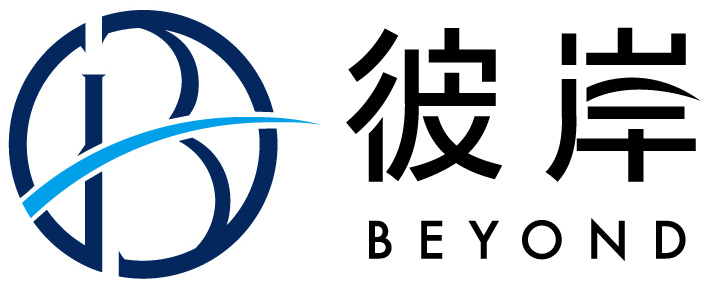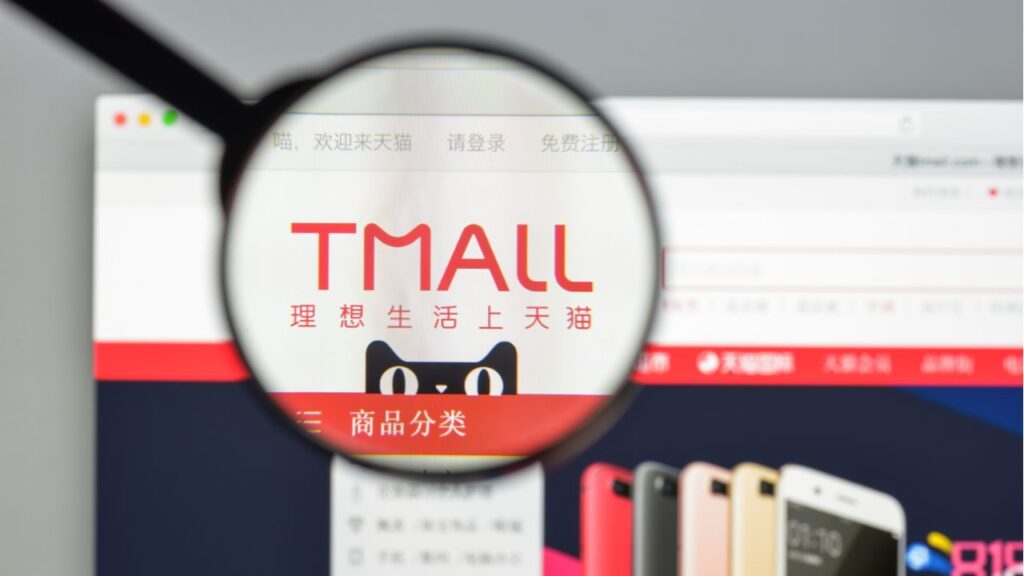Tmall, the Alibaba-owned giant in China eCommerce, offers brands a powerful gateway into one of the world’s largest and most dynamic online marketplaces. Known for its focus on quality and authenticity, Tmall attracts Chinese shoppers in search of premium local and international products. For brands, understanding the full range of Tmall Media costs and leveraging China branding strategies effectively can make a significant difference in establishing a sustainable presence. This guide covers everything from setup fees to the impact of content marketing, helping brands make the most of their investments in China’s highly competitive eCommerce environment.
Tmall’s Market Power and Media Investment in China eCommerce
As China’s leading B2C eCommerce platform, Tmall gives brands access to a vast pool of consumers, with over 500 million active monthly users. Unlike Taobao, which caters to budget-focused buyers, Tmall is known for premium offerings and has established itself as a trusted Chinese eCommerce website for both local and imported goods. This distinction makes Tmall a preferred choice for brands aiming to position themselves in the premium segment, which is critical in China’s competitive online marketplace.
Investing in Tmall Media provides access to advanced tools for targeted ads, content, and social engagement, all tailored to resonate with Chinese consumers. To maximize ROI, brands often work with a specialized China marketing agency to refine campaigns and ensure they appeal to local preferences. While initial costs can be high, the potential to reach a highly receptive audience with thoughtfully localized campaigns can yield significant returns.
Setup Costs: Security Deposit and Annual Fees
To launch on Tmall, brands need to account for essential setup fees, which include a security deposit and an annual service fee. These costs serve as a commitment to Tmall’s quality standards, ensuring that all brands are vetted and credible.
Security Deposit
Depending on the product category, Tmall requires a refundable deposit of 50,000 to 100,000 yuan (approximately $7,000 to $14,000). This deposit is refunded if the brand closes its store after fulfilling all obligations.
Annual Fees
Annual platform fees vary by category, generally costing between 30,000 and 60,000 yuan ($4,200 to $8,400). For instance, electronics fall on the lower end, while categories like clothing and food are at the higher end. Tmall also offers partial or full fee refunds if brands exceed certain sales targets, making it possible to offset marketing expenses.
Working with a China eCommerce agency can help streamline the setup process and navigate Tmall’s requirements more effectively. With the assistance of a China marketing agency, brands can ensure they are in full compliance and ready to optimize their investment from day one.
Tmall Advertising Options for Maximum Brand Visibility
Advertising on Tmall is crucial to standing out, and Tmall offers various ad formats to reach targeted customer segments effectively. Brands need a clear understanding of these options to allocate budgets wisely and maximize visibility.
Search Ads
Search ads appear at the top of Tmall’s search results, giving brands high-priority exposure. While the cost per click (CPC) can be high, search ads are one of the most effective ways to reach consumers actively looking for specific products.
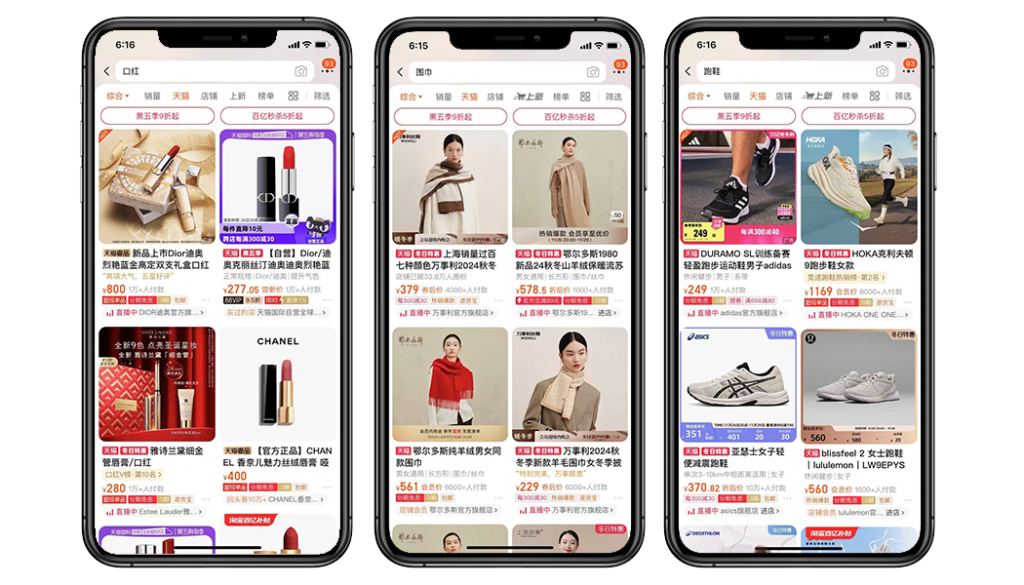
Display Ads
Display ads, which appear on the homepage or in specific categories, use compelling visuals to boost brand recognition. These ads operate on a cost-per-impression basis, making them effective for brand awareness campaigns.
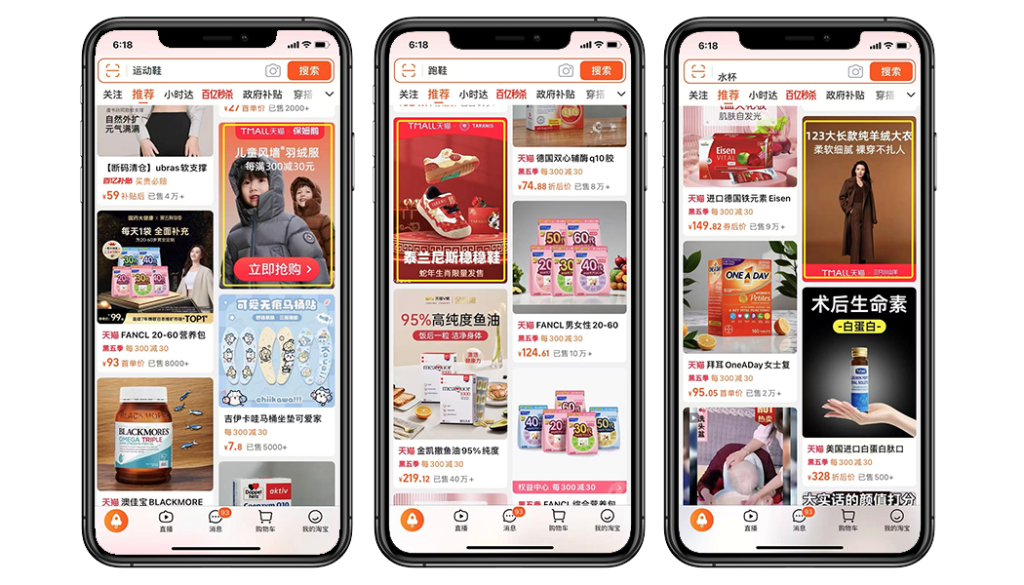
Livestreaming
One of the fastest-growing formats in China’s eCommerce space, livestreaming has become popular for engaging Chinese shoppers in real time. It allows brands to connect directly with viewers, demonstrate products, and answer questions, making it a highly effective tool. Collaborating with China influencers, or Key Opinion Leaders (KOLs), during livestreams can also amplify reach and engagement.
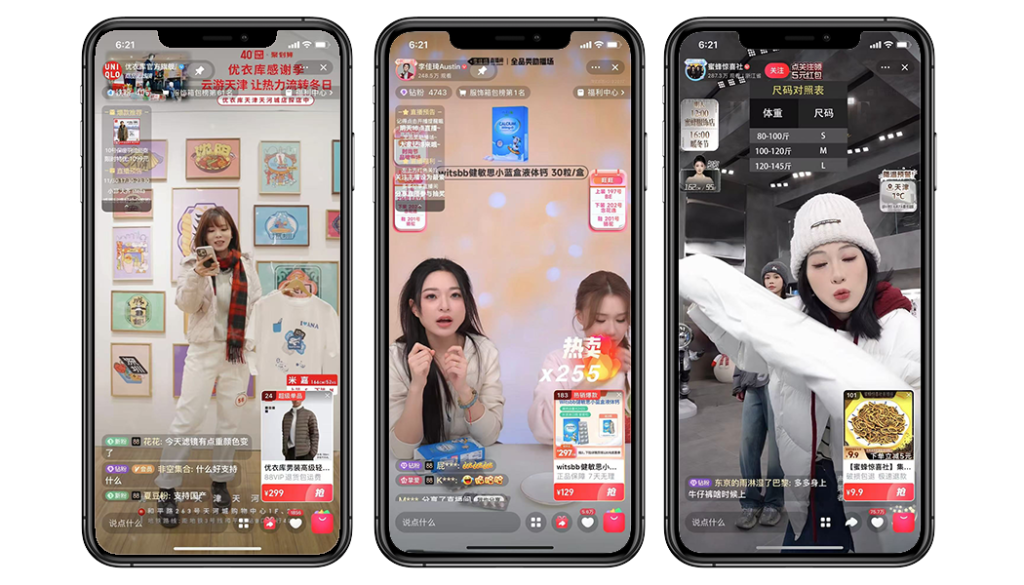
Brand Zone Ads
For brands looking to make a lasting impression, Brand Zone Ads provide a customized storefront with unique visuals, descriptions, and promotions that enhance brand identity.
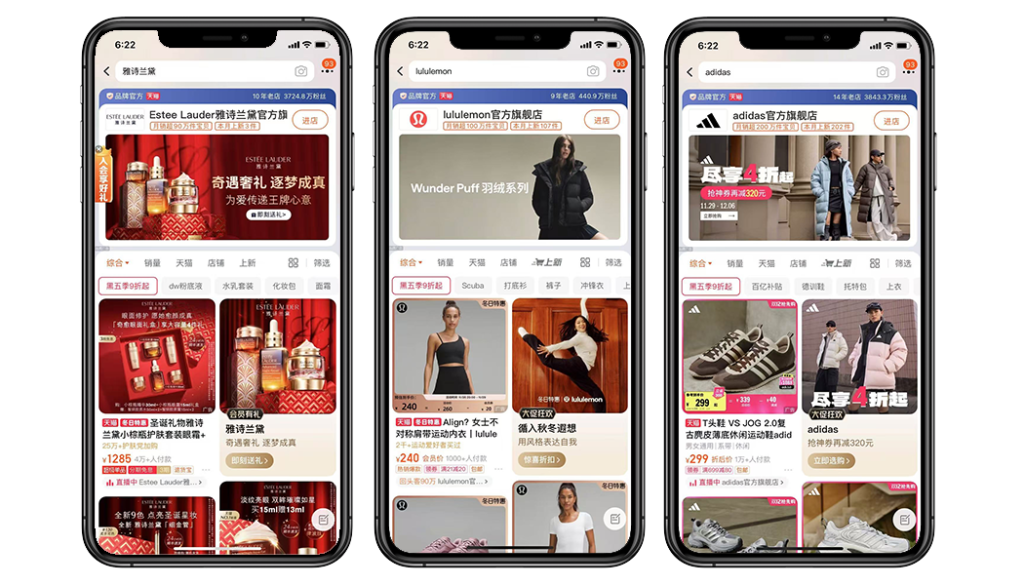
Since each ad format has its own cost structure, working with a China performance marketing specialist or a social media agency in China can help ensure campaigns are optimized and budgets are spent strategically.
Content Marketing and China Influencers
Content marketing on Tmall goes beyond traditional advertisements, with storytelling and influencer collaborations playing key roles in reaching consumers. As China eCommerce continues to grow, so does the demand for localized content and influencer partnerships that resonate with local shoppers.
- Localized Content: Product descriptions, visuals, and brand messaging should be carefully localized, meaning they need to align with cultural expectations and shopping behaviors in China. High-quality visuals and detailed descriptions that convey value are essential for building trust among Chinese consumers.
- Influencer Collaborations: China influencers, also known as Key Opinion Leaders (KOLs), help brands reach target audiences through trusted recommendations. These influencers have established audiences and are particularly effective in bridging the gap between foreign brands and local consumers. While top-tier KOLs charge higher fees, micro-influencers provide a more affordable option for targeted reach.
By tailoring content and leveraging KOL marketing on Tmall, brands can create a shopping experience that feels relevant and engaging to Chinese consumers. Working with a social media agency in China can further enhance content alignment and boost results.
Strategic Participation in Tmall’s Key Promotional Events
Tmall’s shopping events, such as Singles’ Day and the 618 Festival, are massive opportunities for brands to drive visibility and increase sales. Participation in these events often requires additional ad spend but can deliver significant returns when executed strategically.
- Singles’ Day (November 11): The biggest shopping day globally, Singles’ Day generates record-breaking sales in China. Brands typically prepare months in advance, running special ads, offering exclusive discounts, and creating limited-edition products to attract buyers.
- 618 Shopping Festival (June 18): This mid-year event is another major opportunity, drawing in millions of shoppers looking for deals. Brands invest in tailored promotions for this festival, aligning campaigns with anticipated consumer demand.
- Chinese New Year: This season provides an opportunity for themed campaigns focused on gifting, which is highly popular during the festive period.
Participation in these promotional events, while requiring additional investment, is essential for building momentum and establishing a foothold in China’s eCommerce market. Many brands turn to a China eCommerce agency to optimize campaign timing, design, and messaging for each event.
The Role of Tmall Partners (TPs) and Their Fees
Navigating Tmall’s requirements, managing local customer service, and handling logistics can be challenging for international brands. That’s where Tmall Partners (TPs) come in—agencies that provide specialized support to ensure smooth operations on the platform.
TP Services
Tmall Partners help with store setup, ad placements, campaign analytics, and ongoing customer service, ensuring brands can focus on core operations. TPs are particularly valuable for managing the logistical and operational requirements of Tmall.
TP Fees
These agencies generally charge a monthly retainer and may take a percentage of sales. For brands serious about establishing a strong presence, the investment in a Tmall Partner is typically worthwhile, as it improves efficiency and helps optimize the brand’s performance.
A reputable China marketing agency or eCommerce agency in China can provide invaluable support by acting as a Tmall Partner, streamlining operations, and ensuring campaigns align with local trends and expectations.
Maximizing Tmall Media ROI for China eCommerce Success
Establishing a successful presence on Tmall requires more than paying fees and running ads. Brands need to approach China’s eCommerce market with a strategic combination of targeted ads, localized content, participation in major shopping events, and partnerships with Tmall Partners or a trusted China eCommerce agency. Although initial costs on Tmall can seem daunting, with careful planning, brands can use these investments to achieve significant growth.
As China’s eCommerce platform landscape continues to expand, Tmall remains a critical channel for brands seeking engagement with Chinese consumers. By thoroughly understanding Tmall’s media costs and using its various tools effectively, brands can maximize their ROI, build brand loyalty, and establish a sustainable presence in China’s dynamic eCommerce environment.
